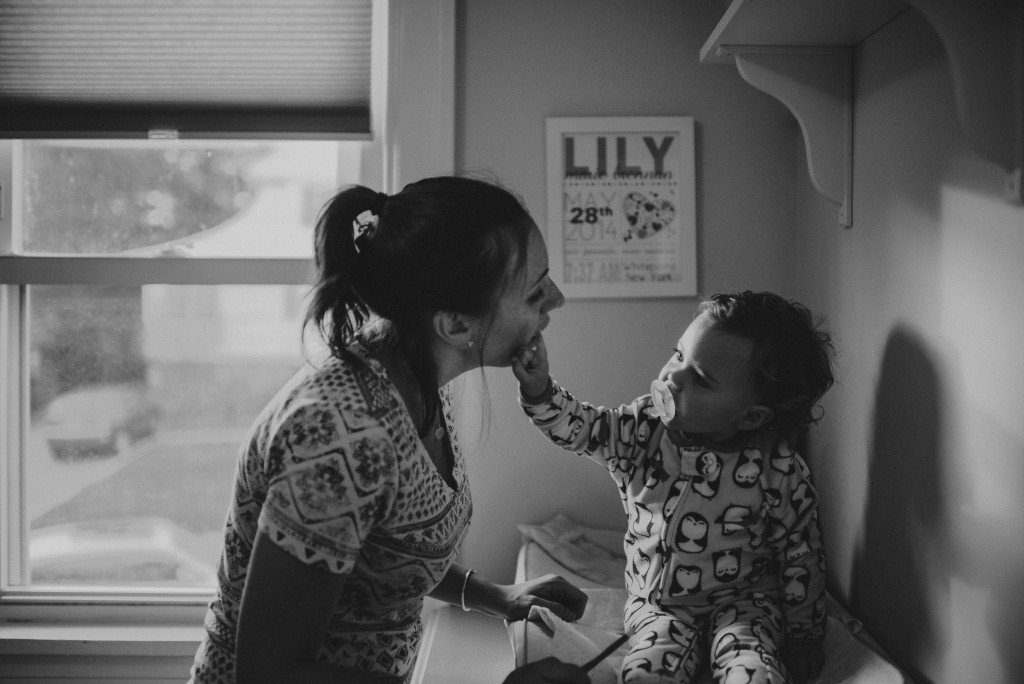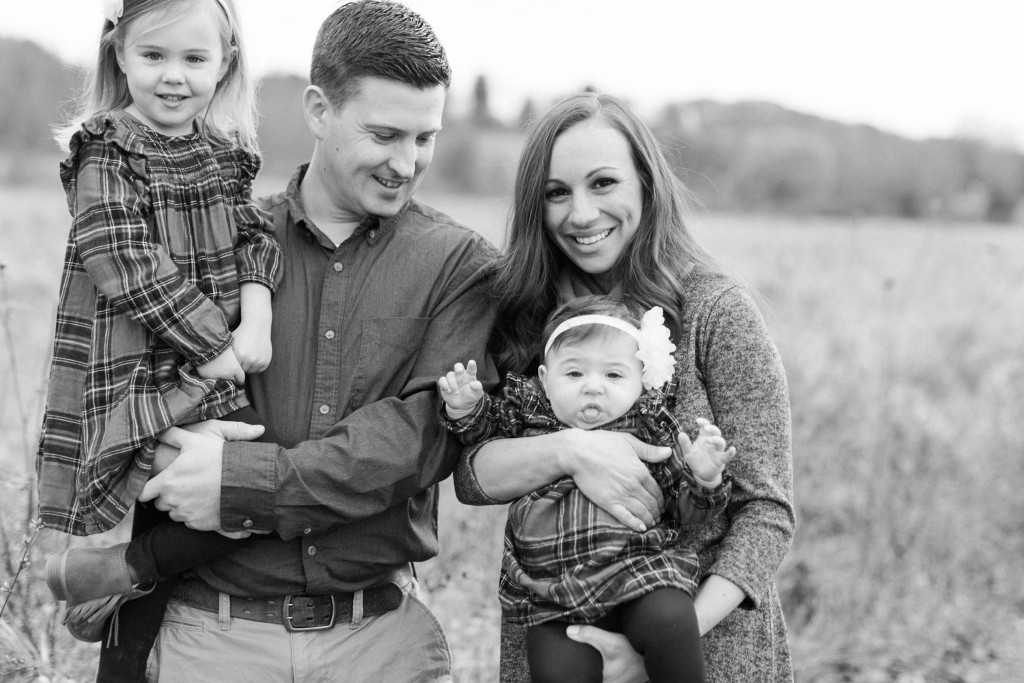
My Story
I’m Amy and since I can remember (and like most little girls with their baby dolls) I always dreamed of becoming a mother. Now, I have been blessed with two beautiful daughters and a wonderful husband to share my dream with. I love them all so much and could not be happier. However, for the past 4 years I have also been battling postpartum depression and OCD. It is still a struggle for me to even admit this, but I am working on it, and ready to share my story. Hopefully writing this will continue to help me overcome these challenges and possibly help others facing similar challenges.
The not so glamorous part of motherhood…
Chrissy Teigen said in her Glamour essay something that really spoke to me. She said, “I still don’t really like to say, ‘I have postpartum depression,’ because the word depression scares a lot of people. I often just call it “postpartum.” Maybe I should say it, though. Maybe it will lessen the stigma a bit.” I find myself calling it “postpartum” all the time. When I was really feeling down, not only could I cry at the drop of a hat, but I became angry and frustrated and would constantly ask, “Why is this happening to me?!” “What did I do to deserve this?!” “Am I terrible mother?” “I’m such a mess, my husband deserves better.” I can go on and on with the self-loathing things I would say. Not many people know that postpartum depression is the most common complication of childbirth, and it does not mean you are crazy. It does NOT define who you are as a person, it is a condition that needs to be treated, such as a heart condition. This is something I truly wish was brought to my attention earlier on in my life, possibly at a visit to the gynecologist. Sure, I may have taken it with a grain of salt at the time if I wasn’t planning on having children just yet, however, I strongly feel that mental health needs to become just as important as physical health in society. If I am at the doctor getting a physical, why isn’t there a doctor who specializes in mental health there? I am hopeful that will change one day. Mental health has come a long way but there is still so much more to do. I truly hope one day there won’t be a stigma attached to mental health. People often associate postpartum depression with the horror stories of mother’s killing their babies. That is actually something called postpartum psychosis and is a rare illness, unlike postpartum depression where one in nine women are impacted by the condition. Also, something I wish I knew before it happened to me. It hasn’t been properly diagnosed, or really spoken of, but depression does run in my family. Having a better understanding of the illness, I can now make sense of the behaviors in a lot of my family members. If I was educated on this at a younger age, maybe I wouldn’t have been so scared when it happened to me. But my generation still struggles with an understanding of mental health so it’s easy to see why I was never educated on this.

Where it all began…
I gave birth to our first daughter in May of 2014. Being in the hospital was a whirlwind. There are so many people popping in and out, it’s not exactly real life. Throughout my entire pregnancy, I planned to nurse our baby. During our second night in the hospital, our daughter stopped latching. Not only was I exhausted, but my nipples also were extremely sore and I had multiple nurses squeezing my boobs to try and express as much colostrum as they could to bottle feed the baby. The batch of nurses I had 4 years ago were very pushy with the whole “breast is best” saying. I can recall one nurse even saying “I hate to do this but if the baby loses any more weight we’re going to have to give her formula.” I took her saying that as if she was implying she had to give my baby poison. Not only did I feel like a failure, I felt like I wasn’t giving my baby something healthy. I should mention I am a pretty emotional person so the tears were just flowing at this point. My poor husband had absolutely no clue what to do in this situation since this is our first baby. They did end up giving her formula and also continued to have me pump. We were sent home on a Friday with instructions on how and when to pump/formula feed. Not only was I bringing home a brand-new baby to care for, I had to figure out how to feed her since the way I planned on wasn’t working. I am a planner so when my plan didn’t work out, I became very stressed. Even typing this out I can feel the stress thinking back about that time. Since we went home on a Friday, we didn’t get to see the pediatrician until Monday. That was probably one of the hardest weekends of my life. The baby cried for most of the time unless she was sleeping. I am very close to my mother and we were very lucky to have her home with us to help, but it was still very hard. I didn’t know what to do. That Monday at the pediatrician’s office, I walked in not only looking like a zombie, but burst into tears when they asked me if I was nursing. The pediatrician was the first person to make me feel better. She simply said, “OK, let’s give her a bottle.” She filled up a bottle of formula to 3 oz (the hospital only told me to give 1 oz). She drank the whole thing then slept “like a baby.” I felt some relief after this and made the decision to bottle feed our daughter. It was a decision I struggled with for her first couple years of life, but knowing that she was fed and healthy made it easier to come to terms with. OK, so now we have the feeding part under control, but why am I still crying? I thought it was just hormones. But several weeks after I delivered, the tears would not stop and I felt very hopeless, almost numb. I was definitely showing signs of depression. My doctor prescribed me antidepressants which helped with the constant crying and sadness, but I was far from recovered. During our daughters entire first 2 years of life, I felt like I had to be in constant control of everything that happened to her. If I was out of control, I felt a lot of anxiety. I now see that this probably offended a lot of family members and friends because I didn’t want anyone else (other than my husband and mother) to even change her diaper. This did cause tension between some family members and even in our marriage. At the time I couldn’t believe my husband didn’t agree with me 100% on everything and it would make me extremely upset. However, neither of us really knew what was going on. I was just a control freak who bugged out like a crazy person whenever someone was with our baby. Side note, this was something completely out of my control. When our daughter was around a year and half, something terrible started happening to me. I had NO idea what it was at the time, but I knew it was not normal so I called my doctor (I’ll get to what was happening in a minute). She advised that I see a psychiatrist because maybe the antidepressant she had been prescribing me wasn’t the correct one and wanted a professional to evaluate my mental state. The psychiatrist diagnosed me with not only postpartum depression but postpartum OCD…what’s that?? This is taken directly from the Postpartum Support International website, “Postpartum Obsessive-Compulsive Disorder (OCD) is the most misunderstood and misdiagnosed of the perinatal disorders. You do not have to be diagnosed with OCD to experience these common symptoms of perinatal anxiety. It is estimated that as many as 3-5% of new mothers and some new fathers will experience these symptoms. The repetitive, intrusive images and thoughts are very frightening and can feel like they come “out of the blue.” Research has shown that these images are anxious in nature, not delusional, and have very low risk of being acted upon. It is far more likely that the parent with this symptom takes steps to avoid triggers and avoid what they fear is potential harm to the baby.” OK, so on to what was happening to me. I was experiencing intrusive thoughts. I still am not comfortable sharing what my intrusive thoughts were and have only spoken about them to the psychiatrist. Hopefully one day I can get to a point where I am OK with sharing this. This is the part of my story I really want to emphasize. I had no idea what an intrusive thought was, and I definitely didn’t know it was a common symptom of postpartum OCD. I just kept thinking, “what the actual F*** is wrong with me?” This is taken directly from intrusivethoughts.org, “More commonly referred to as Postpartum OCD, this post-pregnancy illness is an anxiety disorder that is associated with disturbing thoughts or images revolving around common OCD obsessions. Harm obsessions and sexual obsessions are especially common in Postpartum OCD ― both of which cause the parent to distress about the baby’s safety or their ability to keep the child safe. The saddest part about this illness is that it affects the people least likely to ever present a real threat to their children in any way. The thoughts or images (sometimes both at once) are always unbearably distressing to the sufferer and cause them great guilt, shame, sadness and ― in some cases ― severe depression. This is because the people who suffer from this form of OCD have been proven to be people who are extremely dedicated to living a wholesome or moral life. They are people who are distressed and disgusted by the exact images, thoughts or impulses that intrude their mental space time and time again and which target the people or things they love most.” Sounds terrible right? It is. The psychiatrist did end up switching my antidepressant to something that was better for OCD and it helped tremendously. I didn’t feel 100% comfortable having therapy sessions with this particular psychiatrist but I didn’t feel like going through the process of finding someone new and explaining this all over again. Also, she is very well educated on OCD and knew exactly what antidepressant would work. At this point, our daughter is over 2 years old and people LOVE to ask the question, “when are you having another?” I knew I wanted to have at least one more baby, but I was completely terrified. Trying to explain that to most people only makes them feel uncomfortable so I would usually respond with, “maybe in another year.” Another year had come and gone and I finally felt like myself again and was on the right path. I felt like the time was right to try again. I ended up staying on a low dose of my antidepressant throughout my pregnancy and was monitored more closely. I gave birth to our second daughter in May of 2018. I was totally aware that all of my symptoms might return after delivery, but you’re never really prepared to experience it. Since she was born at 36 weeks, she was required to go to the NICU. This was very hard for me but thankfully she was able to come home from the hospital with us. This time when nursing didn’t work out, I was completely confident that our baby would be healthy being formula fed. I also had two amazing NICU nurses who were so laid back about formula feeding. That meant more to me than they will ever know. The hardest part about the hospital this time around was when our now 4-year-old came to visit. She had a very hard time leaving us when it was time for her to go home. My husband and I were in tears and I felt so guilty. I was constantly worrying if this was somehow going to damage her for the rest of her life. That, by the way, was a catastrophic thought. A catastrophic thought is defined as ruminating about irrational worst-case outcomes. It increases anxiety and can prevent people from doing things in life. I often have catastrophic thoughts, but I am learning to become more aware of them.
The same, but different (and how I am getting better)
I would say the postpartum depression came about a week after we came home from the hospital with my second daughter. It was also completely different this time around. Thankfully I did not experience any intrusive thoughts or felt the need to control everything, however, the constant crying and sadness came back, and now I felt completely overwhelmed as a mother of two. The anxiety was so debilitating that my husband had to take a month off of work. I did not want to be alone with the two of them. I would never do anything to harm them or not take care of them, but I needed him home until I got this under control. My patience was also at an all-time low. Everything my 4-year-old was doing would irritate me, and then I would feel guilty about losing my patience with her. The silver lining in all of this was that this time, I knew what it was and I knew how to treat it. The doctor raised the dose of my antidepressant and after a few weeks I started feeling better. As I mentioned before, I wasn’t very comfortable having therapy sessions with this psychiatrist and would sometimes leave a session feeling discouraged. She knew medication and the clinical side to things but I always felt like she never really understood exactly how I was feeling. I finally said I need to talk to a therapist who has personally experienced postpartum depression. I knew it was going to be a lot of work to start over but I needed to do this for myself and for my family. I need to be the best version of myself for my husband and my girls. I also want to be healthy, physically AND mentally. My family needs me. A friend of mine told me about Postpartum Support International. It is a website with lots of information and people who can help you find a therapist in your area. I found a wonderful therapist, and my journey continues. It is far from over but I hope to keep learning and working hard. This is where I am at right now. If my story helps one person feel like they’re not alone, that will make me happy. Some may read this and roll their eyes thinking I’m bat sh*t cray. That’s OK, I struggle with coming to terms with this myself. However, I wanted to write my story for that new mom who is obsessively searching Google to figure out if something is wrong with her. Maybe she will come across this and feel hope. I also wanted to write this for the partner of someone dealing with postpartum depression. It’s not an easy thing to live with but your love and support will mean the world. Reassure her that you’re not going anywhere and will wait this out as long as it takes. Educate yourself on postpartum depression. Go to therapy together so you have a better understanding of what is actually going on. Most importantly, take her seriously and listen to her concerns. This doesn’t mean you are weak, it actually means you are strong. I still have to give myself pep talks saying what I am doing to feel well is a sign of strength, not weakness. I certainly am not trying to say I’m the expert on this and I definitely don’t go around wearing a shirt that says “I have postpartum depression,” This is just my story. I pick and choose who I feel comfortable talking about this with. There are some people in my life I wish I could share this with but it is not something they are comfortable talking about. I do, however, feel very lucky to have my husband, my mother, and a few close friends I can be open with. Hopefully my girls won’t ever have to feel uncomfortable talking about their health. The one thing I really want to work on now is overcoming this constant fear I have that the feelings of depression will one day return and thinking I’m going to have to take antidepressants my entire life. Maybe I do, but I’m getting ahead of myself. I have to constantly remind myself to stay in the present. Depression is not just in your head, it physically hurts, you think you’re going crazy, and nothing helps you feel better. There were days that all I wanted to do was lay in bed and cry my eyes out, but I have 2 daughters to take care of. I also feel like I have a new calling in life. Once my girls are a little older, I hope to start a new career doing something that helps new moms struggling with postpartum depression. But for now, I’m still working on me. I love my girls more than I could ever express in words, I don’t want to waste this precious time in their lives not feeling well. They’re only little for so long.
Amy Brennan

